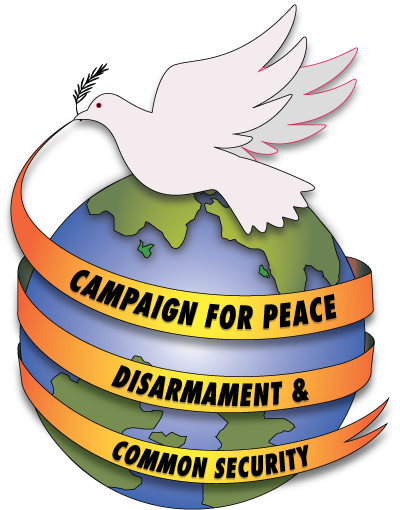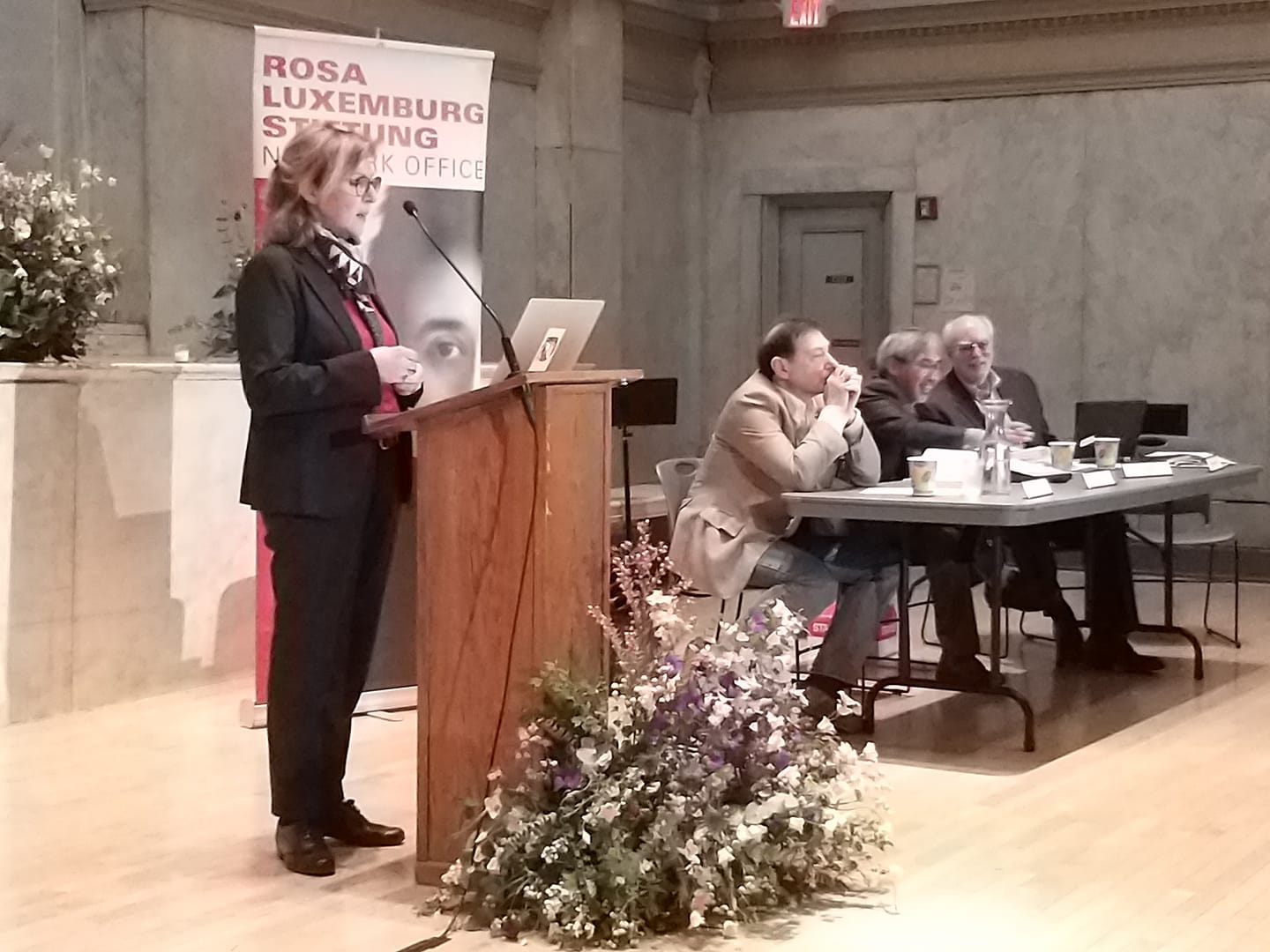Arielle Denis
I shall briefly draft the global picture as I see it in this new situation, and highlight the need to articulate human security and common security maybe create a new concept related human security or interlinked common security.
I’ll end by showing that fighting nuclear weapons are to me one of our best assets to challenge the actual architecture of domination and the industrial military complex.
As you know, right and extreme right fight the battle for cultural and political hegemony since the 80’s against fundamental rights and especially against equality, against solidarity, for securitarian ideologies and to amplify the disqualification of progressive projects. They led the offensives against workers in generalizing precariousness; against the welfare state through privatization, to protect /organise the widespread corruption of political classes and to subordinate digital technology to the logic of finance.
But this rise in power of straight and extreme right was and is not imposed without resistance. People are fighting everywhere and the confrontation is becoming more and more violent.
The hardening of contradictions and social tensions explains the emergence of extreme forms of confrontation. But, there is also another reason for the situation, it is the anxieties related to the emergence of a new world. Bolsonaro, Trump and other far right governments are the grimacing faces of this anxiousness. Take the example of a right wing elector of Alabama, we have the same persons in Europe, he is white, middle class affected by precariousness, he looks around, what does he see? The Indians are still there; the blacks refuse the segregation, the latinos become majority, the women want half of the power. The world he imagined already no longer exists, and cannot exist.
So what about the new world and prefiguring the contradictions of the future?
We can identify five mutations in progress, unfinished revolutions whose first upheavals we already perceive.
1.The revolution of women’s rights challenges millennial relationships.
2.The revolution of the rights of peoples, the second phase of decolonization, after the independence of the states, emphasizes the liberation of peoples and questions multiple identities.
3. The ecological challenge and the awareness of finite resources and humans as a specie is a deep philosophical revolution.
4. The Tech revolution: Digital renews language and writing and biotechnology question the limits of the human body.
5. The upheaval of the planet’s population is underway, it is not a migration crisis but a world demographic revolution.
There are several upheavals under way, unfinished and uncertain revolutions. There is no reason to say that they will not be crushed, deviated or recovered. But nothing allows either to affirm it. They upset the world; they are also hopeful and already mark the future and the present.
Resistances are building everywhere, in many different forms that differ from the 80’s. The resistances define the refusals and open the tracks of the necessary and possible alternatives. Starting from the resistances, we can put them into perspective in a project. The legibility of an alternative project is emerging through refusals.
To resist you have to create. Resistance opens the field of possibilities.
The radicality of the struggles is carried by their singularity. Each fight carries overtaking. It reveals unexpected horizons at first.
We have seen this with the radicalism of women’s movements, the movements of traditional peoples and more specifically black movements of Afro-descendants, cultural movements.
The convergence of movements is not done by reducing their radicality to make them compatible. It is reflected in the invention of new approaches. For example, intersectionality in the convergence of social movements, women’s movements, Afro-descendant movements. In the same way, the generational refusal of the destruction of the world environment by the greed economy domination.
To resist is to create; to create is to resist. This approach that links resistance and creation defines the strategic approach. The strategy is defined and built in the articulation between the response to the emergency and the implementation of an alternative project. We must respond to the urgency with proposals that respond to situations immediately. But urgency is not enough to change situations; emergency actions must be articulated with alternative proposals, with a project.
Social movements and citizens are confronted with the definition of their strategy, the nature of social bases and alliances. Our societies are changing. The new is built through the old. In the carriers of transformation, the relations between movements, social classes and peoples are redefined. Class struggles remain decisive; but the social classes and the relations between the social classes change. Let us remember that during the revolution of 1789, none of the two principal classes, the peasantry and the aristocracy, prevailed; they are classes born from the process, the bourgeoisie and the working class that have emerged.
II How does this match with security issues?
The traditional security dilemma between sovereignty and protecting the national interest abroad is strongly back again to bridging together security and the military, to confuse the two. It derives from it a culture of security that has much difficulties to think in the collective mode. This idea of a collective security was initiated by the League of Nations (SDN), after the first world war, but the old sovereignty reflexes were not slow to reappear …
Globalization challenges the principle of sovereignty at least three times. First, by being inclusive: the entire humanity, for the first time in its history, acts on a single scene that imposes so many constraints and standards potentially common. Then, cultivating interdependence: far from being subordinated to the conditions of competition as before, my survival depends on the links that unite me to others. Finally, by promoting mobility: in a world of generalized communication, everyone sees everyone and everyone is potentially or really elsewhere. As a result of a competitive and sovereign security, we pass slowly but surely to a ‘related security’. My security now depends on the fulfillment of that of the other and the construction of the one of all …
The shock is primarily cultural, which helps to explain why resistance to such a change is so vivid. Even when we agree that security can be a common good for all humanity, the reflex is quick, when we define its boundaries, to think first of national interests endangered. We simply forget that, conversely, no particular interest can survive anymore without first meeting the conditions for minimum collective security.
Multilateralism has made progress in the very conception of this collective security escaping the laws of sovereignty and the weight of national selfishness; multilateralism only could guarantee its equitable implementation … but we know that it is never a given : multilateralism has a strong tendency to reflect the values of the most powerful and to protect the interests of the latter as a matter of priority.
Yet, the conceptual evolution of collective security made a huge step forward in 1994, when the Treaty on the Prohibition of Nuclear Weapons (TPNW) has been voted by 122 states in the UN in July 2017.
The TPNW tells us: Nuclear weapons are unacceptable in their very essence and we prohibit them before we eliminate them.
The mobilization of these 122 states against the 9 nuclear states including the 5 Security council members is one more interesting sign of resistance.
Nuclear weapons are a week point in the architecture of domination. When the climate change issue is such a high priority in people’s mind which brings us slowly but surely to human and other living things extinction, how would nuclear weapons be acceptable?
They are only 9 countries to take the decision and the pressure of shame is building against them. The TPNW is generating a global push that includes the vast majority of governments from the South, international organisations like the Red Cross, religions, trade unions, and global civil society environment, human rights, indigenous movement, to put an end to this deadly threat of nuclear weapons. Nuclear weapons are a symbol of a world that is disappearing, a world where you could extract and waste resources for ever, a world where mass killing and genocide has been possible, a world that was thinking itself as endless.
A world that is unsustainable.
Now, I’d like to quote part of the speech that Greta Thunberg give to the world social economic forum, not just because it is a brave, just and inspiring speech but because also it demonstrates that what we have in mind in this room, our will to radically change things is widely shared by millions of people, noticeably by the new generation:
“Our civilization is being sacrificed for the opportunity of a very small number of people to continue making enormous amounts of money. Our biosphere is being sacrificed so that rich people in countries like mine can live in luxury. It is the sufferings of the many which pay for the luxuries of the few. The year 2078, I will celebrate my 75th birthday. If I have children maybe they will spend that day with me. Maybe they will ask me about you. Maybe they will ask why you didn’t do anything while there still was time to act.
You say you love your children above all else, and yet you are stealing their future in front of their very eyes. Until you start focusing on what needs to be done rather than what is politically possible, there is no hope. We cannot solve a crisis without treating it as a crisis. We need to keep the fossil fuels in the ground, and we need to focus on equity.
And if solutions within the system are so impossible to find, maybe we should change the system itself. We have not come here to beg world leaders to care. You have ignored us in the past and you will ignore us again. We have run out of excuses and we are running out of time. We have come here to let you know that change is coming, whether you like it or not. The real power belongs to the people. Thank you.”

